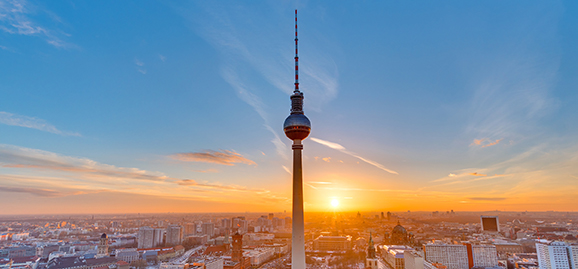2018-04-13 | Berlin is the Fastest Rising Property Market in the World

Berlin is the Fastest Rising Property Market in the World
Average prices leapt by nearly 21% last year – is the bubble about to burst?
13th April 2018, London. Berlin now tops the world as the city with the fastest urban house price growth according to a new report from Knight Frank. Property prices jumped by 20.5% in 2017 putting it at the top of the 150 world cities it surveyed. The German cities of Hamburg, Munich and Frankfurt also made the top 10 with price growth of between 13% and 15% compared to an average increase of 4.5%. At the end of 2016, 12 cities, most of them Chinese, registered price growth above 20%, a year later only one city falls into this category; Berlin. Low-interest rates, foreign investment and a growing population over the last ten years have caused the property market to escalate.
“It isn’t surprising given the level of buyer demand the city has seen over the past few years,” says Achim Amann, co-founder of Black Label Properties. “The growth of the luxury sector here is expanding rapidly, and prices are climbing much faster than anyone expected. We’re seeing larger numbers of international investors who are willing to spend at the very high end of the property market, and that is great for Berlin’s real estate economy.” In 2017 the international agency increased its turnover to over 1.3m euros and sold a total of real estate worth over 22 million euros to its German and international customers. They are currently brokering Berlin’s most expensive property – the highest ever asking price, which triples the current record for the sale of a home.
“The difference between Berlin and the other cities is that there is a huge shortage of apartments here and an ongoing influx of people moving to the city. Berlin’s population has grown by 50,000 per year on average over the last five years and is now at 3.5 million.”
Residential property in Berlin is still affordable for overseas investors when compared to prices in cities like London and New York, and this has encouraged foreign buyers. Last month US investor Warren Buffet acquired a luxury real estate agency in the city. Commercial property is also thriving. Berlin’s Sony Centre complex was bought for 1.1bn EUR in October by the pension fund of Ontario’s municipal employees, and Norway’s state pension fund has paid around 400m EUR for the Mitte HQ of Axel Springer.
However, for those on an average Berlin wage the hike in prices has led to a shortage of affordable homes. A new study from the Hans Bockler Foundation shows that there is a severe lack of affordable apartments throughout Germany – demand currently outstrips supply by 1.9 million in Germany, and by 310,000 in Berlin alone. Fitch Ratings said this week that residential prices across the country have risen by 60% since 2010, with an 8.6% rise in 2017 alone. They also advised that the growth rate may slow down as mortgage rates increase.
Germany’s central bank, the Bundesbank, is keeping a close eye on developments and said recently that housing in many German cities is 15% overpriced and up to 35% in Berlin – where rent costs for new leases have risen by more than 9% in 2017.
We expect demand for premium property in Berlin to remain high, and we do have measures in place to ensure that it doesn’t follow in the footsteps of London. “The regulations are stringent about property purchase in Germany. Locals need a 15% deposit and non-German taxpayers a minimum 30% deposit. We do not have buy-to-let on the same scale as the UK because of the high transaction costs.”
Notes for editors:
Knight Frank: → Berlin bucks global trend as urban house price growth slows
The Guardian, → Berlin tops the world as the city with fastest rising property prices
ABC News, → Inside Berlin’s most expensive apartment


